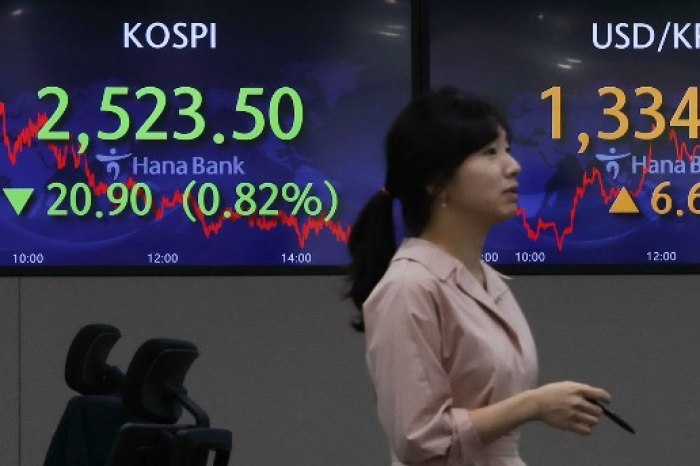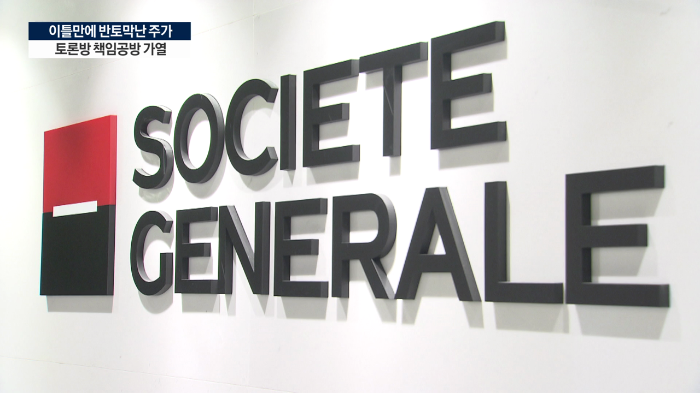Korean stock market
Ponzi scheme suspected behind SocGen-triggered Korean stock havoc
The FSS chief has ordered a probe into possible fraudulent trading of stocks with higher margin trading volumes
By Apr 25, 2023 (Gmt+09:00)
5
Min read
Most Read
LG Chem to sell water filter business to Glenwood PE for $692 million


KT&G eyes overseas M&A after rejecting activist fund's offer


Kyobo Life poised to buy Japan’s SBI Group-owned savings bank


StockX in merger talks with Naver’s online reseller Kream


Meritz backs half of ex-manager’s $210 mn hedge fund



The South Korean financial authorities will investigate whether unfair trading practices are behind leverage trading after massive margin call requests from Société Générale S.A. (SocGen) in connection with its clients’ trading of contracts for differences (CFDs) triggered a free fall of the country’s city gas stocks on Monday.
With a chill in the air amid the shock of possible investment scams, the country’s stock market is expected to remain subdued for some time, market analysts warned.
On Tuesday, the eight stocks that tanked Monday due to SocGen’s likely CFD margin calls extended their losing streak.
City gas supplier Samchully Co. tumbled by the daily limit of 29.99% to end at 244,000 won ($182.77) Tuesday after plummeting 30% on Monday. Its peers Daesung Holdings Co. and Seoul City Gas Co. also plunged 30%, respectively, in the same period.
Other margin call targets Sebang Co., Daou Data Corp. and Sun Kwang Co. also extended their downward spiral for two straight sessions, each with a 30% loss.
Their sell orders remained undigested in the market, while Harim Holdings Co. and Daol Investment & Securities Co. fared better to clear some of their sell orders, ending down 13.13% and 9.92%, respectively.
All these eight stocks suddenly nosedived on Monday after SocGen placed massive sell-off orders of their shares upon margin call requests from its clients for their CFDs.

More margin call requests even for non-CFD margin trading are expected to follow after the country’s Financial Supervisory Service (FSS) chief early on Tuesday ordered an investigation of possible fraud in margin trading after the latest stock market debacle, which would further weigh on the local stock market, market analysts warned.
“We will swiftly investigate any stock suspected to be buoyed by unfair trading schemes and take prompt action against them,” Lee Bok-hyun, FSS governor, said, noting that the Korean stock market has been overheated following a surge in margin trading of stocks with specific themes like secondary batteries.
CFDs AS A PONZI SCHEME VEHICLE
The collapse of the eight stocks, dumped by the French-based multinational financial services company, comes after their rallies over the past year without specific stock-buoying events, suggesting their overruns might have been manipulated by scammers. They are also considered illiquid stocks, mainly small and medium-sized holding firms.
Compared to a year earlier, their stock prices had jumped by two to five times. Samchully quintupled to over 500,000 won early this month from early last year.
Some stocks galloped more than 10 times compared with 2020. Sun Kwang topped 170,000 won apiece on April 21 versus about 10,000 won three years ago. Over the same period, Daesung Holdings zoomed 19 times.
Their unexplained gains have invited the scrutiny of the Korean financial authorities, suspecting organized Ponzi schemes, which might have allegedly tapped high-income individual investors like doctors, lawyers and celebrities to invest in undervalued stocks, using their CFD accounts.

The eight battered stocks were purchased mainly by institutional investors over the past one to two years.
CFD is a highly leveraged securities trading method that allows traders to bet on the price direction of securities without owning the physical underlying instruments.
In Korea, investors are allowed to buy and sell stocks with margins of 40% through CFDs while utilizing leverages of up to 2.5 times. The leveraged bets on CFDs can return their investors big profits but wrong bets would bring massive losses.
CFD traders can also face margin calls once the funds in their accounts are below the margin requirements.
CFD trading is, however, allowed only through securities firms acting as prime brokers, so it is hard to know whether the CFD investors are institutional or individual investors. Nor if they are foreigners or locals.
Over the last year, investors are estimated to have gobbled up more than 300 billion won worth of shares of Samchully, Daesung Holdings, Seoul City Gas, Sebang, Daou Data, Sun Kwang, Harim Holding and Daol Investment & Securities through CFD trading.
DOMINO EFFECT TO RATTLE THE STOCK MARKET
But their flights have come to an end after some investors suddenly changed their position in CFD trading, triggering panic selling by other investors and margin calls.

Their free fall is expected to continue for a while, given the fact that retail investors’ margin balance accounted for 7% to 15% of the total balance. Most of their sell orders remained unsettled on Tuesday even after more than a 50% plunge from their peaks.
Their valuations are still high compared with their peers, indicating more room for a drop.
With the launch of financial authorities’ probe into possible investment scams on overvalued stocks, the latest CFD fiasco could send shockwaves through secondary battery-related and artificial intelligence technology stocks that have recently enjoyed bull runs partly driven by high retail margin trading.
According to the Korea Financial Investment Association on Tuesday, the Korean stock market’s margin trading account balance stood at 20.4 trillion won, surpassing the 20 trillion won threshold for the first time since June last year.
Kosdaq-listed stocks’ margin trading balance amounted to 10 trillion won versus Kospi-listed stocks with 9.8 trillion won, suggesting investors have purchased leading battery materials companies listed on the secondary stock market like EcoPro BM Co. on borrowed money from securities firms.
EcoPro BM dropped 6.5% on Tuesday, while its peer L&F Co. was down 5.4%. POSCO Future M Co. and POSCO Holdings Inc. retreated 4.4% and 4.8%, respectively.
Korea’s main Kospi index skid 1.4% to end at 2,489.02, dipping below the 2,500 mark for the first time since April 7. The Kosdaq lost 1.9%.
Some criticized that the FSS investigation on CFD trading comes too late, considering that it was reportedly notified of possible fraud in CFDs late last year.
Write to Eui-Myung Park and Dong-Hun Lee at uimyung@hankyung.com
Sookyung Seo edited this article.
More to Read
-
 Korean stock marketSocGen dumps Korean stocks, likely due to client margin calls
Korean stock marketSocGen dumps Korean stocks, likely due to client margin callsApr 24, 2023 (Gmt+09:00)
3 Min read -
 Korean stock marketInvestors ready their return to Korean stock market but with bet on declines
Korean stock marketInvestors ready their return to Korean stock market but with bet on declinesApr 06, 2023 (Gmt+09:00)
2 Min read -
 Korean stock marketS.Korea prepares to launch $7.6 bn stock market stabilization fund
Korean stock marketS.Korea prepares to launch $7.6 bn stock market stabilization fundNov 02, 2022 (Gmt+09:00)
1 Min read
Comment 0
LOG IN


